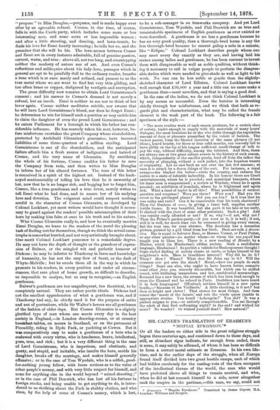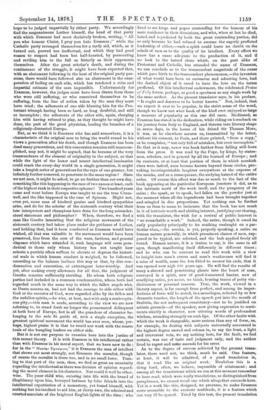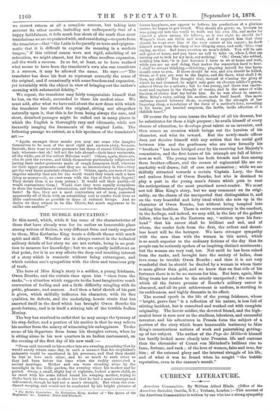MR. CAPNER'S TRANSLATION OF ERASMUS'S " M.SIPIA2 EFKIZMION."* OF all
the leaders on either side in the great religious struggle begun three centuries ago, and continued down to these days, and still, as abundant signs indicate, far enough from ended, there is none, it may safely be affirmed, of whom it has been so difficult to form a correct moral estimate as Erasmus. In his own life- time, and in the earlier days of the struggle, when all Europe found itself divided into two great hostile camps, each of which had bidden emulously for the casting-vote of the then occupant of the intellectual throne of the world, the man who would have preferred above all things to remain neutral, and who, when he did at last commit himself to a side, never altogether sank the umpire in the partisan,—this man, we say, could not
* Erasmus's " Mwpfas ErcoittioP." Translated by James Calmer, M.A. London: Williams and blorgate.
hope to be judged impartially by either party. We accordingly find the magnanimous Luther himself, the head of that party with which Erasmus had most decisively broken, writing, "All you who honour Christ, I pray you hate Erasmus ;" while the Catholic party revenged themselves for a tardy aid, which, as it tuned out, proved too ineffectual, and which they had good reason to suspect had been but half-hearted, by persecuting and reviling him to the full as bitterly as their opponents themselves. After the great scholar's death, and during the continuance of the struggle, it might have been expected that, with an abatement following in the heat of the original party pas- sions, there would have followed also an abatement in the exas- peration of feeling on each side, which has rendered a calm and impartial estimate of the man impossible. Unfortunately for Erasmus, however, the judges must have been drawn from those who were still suffering, or who conceived themselves to be suffering, from the line of action taken by the man they must have tried ; the adherents of one side blaming him for the Pro- testant triumph having been so hard, so long doubtful, and still so incomplete ; the adherents of the other side, again, charging him with having refused to play, as they thought he might have clone, the part of the good physician, healing the breaches of a religiously-distracted Europe.
But, as we think it is Emerson who has said somewhere, it is a characteristic of the original man to bring the world round to his views a generation after his death, and though Erasmus has been dead many generations, and this conversion remains still unaccom- plished, may not, it might be argued, that be because of the very transcendence of the element of originality in the subject, so that while the light of the lesser and nearer intellectual luminaries could reach the every-day world in a single generation, it might take a longish series of generations for the rays of one greater, but infinitely further removed, to penetrate to the same region ? Have we not seen, it might be asked, to go no further than our own day, something like this happening in the case of two names at least, each of the highest rank in their respective spheres? Two hundred years came and went before Europe was taught to see the true Crom- well, and the like happened in the case of Spinoza. Might not, even yet, some man of kindred genius and kindred sympathies arise, and do for the scholar of the sixteenth century what their late interpreters and champions have done for the long misunder- stood statesman and philosopher? When, therefore, we find a man like Goethe lamenting that the religious movement of the sixteenth century had taken place under the guidance of Luther, and holding that, had it been conducted as Erasmus would have wished, all that was valuable in the movement would have been preserved, free from the cost of the wars, factions, and general • diepeace which have attended it, such language will seem pare- .doxical to those only whom history has not taught how minute a particle often suffices to elevate or depress the histori- cal scale in which human conduct is weighed, to be followed, according as the balance inclines this way or that, by dire con- demnation and execration, or extravagant hero-worship. And yet, after making every allowance for all that, the judgment of Goethe remains sufficiently startling. He whom both religious parties had included in a common condemnation, whom both had regarded much in the same way in which the fallen angels who, as Dante assures us, had not had the courage to side either with God or the enemies of God, were regarded alike by the fallen and the nnfallen spirits,—he who, at best, met with only a contemptu- ous pity,—this man is made, according to the view we are now referring to, to stand forth no longer the pronounced delinquent at both bars of Europe, but in all the grandeur of character be- longing to the sole fit guide of, with a single exception, the greatest spiritual movement the world has ever seen, whose, per- haps, highest praise it is that he could not work with the coarse tools of the bungling leaders on either side.
But it is not our purpose to examine here into the justice of this recent theory. It is with Erasmus in his intellectual rather than with Erasmus in his moral aspect, that we have now to do ; for in the " PrIcipiae Blew:IF/be," it is Erasmus the man of intellect that shows out most strongly, not Erasmus the moralist, though of course the moralist is there too, and in no small force. Turn- ing to that part of the man, then, we find as great an unanimity regarding the intellectual as there was division of opinion regard- ing the moral element in his character. Nor could it well be other. wise. The poor child who, entering into life with the brand of illegitimacy upon him, betrayed betimes by false friends into the intellectual expatriation of a monastery, yet found himself, with nothing but his intellect to aid him, at thirty-two, the admired and courted associate of the brightest English lights of the time ; who
lived to see kings and popes contending for the honour of his mere residence in their dominions, and who, when at last he died, hated and repudiated by both the great contending parties, did so only because he had refused to assume the eagerly proffered leadership of either,—such a spirit could leave no doubt on the minds of men as to the quality of its intellect. Every effect we know has a cause adequate to the production of it, and if we look to the hatred alone which, on the part alike of Protestant and Catholic, has attended the name of Erasmus, we can conclude as to the transcendent magnitude of the cause which gave birth to the transcendent phenemenon, —the inversion of what would have been an enormous and admiring love, had the desired object of it cared to have the love on the terms proffered. Of this intellectual endowment, the celebrated Praise of Folly forms, perhaps, as good a specimen as any single work by the same author. As the present translator says, in his preface, "It ought and deserves to be better known." Not, indeed, that we expect it ever to be popular, in the strict sense of the word, though we know not what book of the kind ever enjoyed so large a measure of popularity as this one did once. Meditated, as Erasmus has stated in the dedication, while riding on horseback on his journey from Italy to England, and, thrown into literary shape in seven days, in the house of his friend Sir Thomas More, it was, as he elsewhere assures us, transmitted by the latter, without his consent, to Paris, and there printed, "from a copy," as he complains, "not only full of mistakes, but even incomplete." Be that as it may, never was book farther from falling still-born from the press. It was read by the Pope, by kings, by states- men, scholars, and in general by all the learned of Europe ; and its contents, or at least that portion of them in which monkish vices were lashed, soon became known beyond those circles, pro- voking inextinguishable laughter everywhere at the expense of the monks, and as a consequence, the undying hatred of the entire order. Of course this effect was due as much to the fact of the book appearing at the particular European juncture it did, as to the intrinsic merit of the work itself, and the pungency of its satire ; the spark, so to speak, had fallen on the powder just at the moment when all the ingredients had been brought together and mingled in due proportions. Yet nothing can be further from us than to mean to insinuate that the book has not much in it of intrinsic worth and abiding interest, justifying our sharing, with the translator, the wish for a revival of public interest in "so remarkable a work." Indeed, the satire, though it owed its early popularity principally to its scathing onslaught on a par- ticular elass,—the monks, is yet, properly speaking, a satire on human nature generally, in which prominent classes of men, sup- posed to be typical, are selected, and the lash applied freely all round. Human nature, it is a truism to say, is the same in all ages, though manifesting itself differently in different times ; and he who can be content to read this work with a view to insight into man's errors and man's weaknesses will find it a mine of wealth, none the less fitted to answer his ends, that it was opened now nigh 400 years ago. He will find the results of many a shrewd and penetrating glance into the heart of man, conveyed in a spirit, now of good-humoured banter, now of scarifying satire, yet never, we think, bearing traces of petty vin- dictiveness or personal rancour. True, the work, viewed in a literary aspect, is far enough from perfect, and among its imper- fections of form will be noted, in a monologue, relieved by so few dramatic touches, the length of the speech put into the mouth of Stultitia, the not unfrequent consistency—not to be justified on artistic grounds—of the speaker, now giving expression to senti- ments strictly in character, now uttering words of profoundest wisdom, sounding strangely on such lips. Of the other faults with which the work is chargeable, more serious than any of form, as, for example, its dealing with subjects universally accounted in the highest degree sacred and solemn in, to say the least, a light and irreverent vein, we say nothing here, for the fault, we feel certain, was one of taste and judgment only, and the author lived to regret and make amends for his error.
As to the degree of 811C4C88 achieved by the present trans- lator, there need not, we think, much be said. One feature, at least, it will be admitted, of a good translation is, that it read like an original work. Doubtless this is a thing hard, often, we believe, impossible of attainment ; and among all the translations which we can at this moment remember to have read, which were really translations, as distinguished from paraphrases, we cannot recall one which altogether succeeds here. Yet in a work like this, designed, we presume, to make Erasmus more accessible to the exoteric multitude, it is a feature which I can very ill be spared. Tried by this test, the present translation
we cannot esteem at all a complete success, but taking into account its other merits, including not unfrequently that of a happy faithfulness, it falls much less short of the mark than most translations we are acquainted with, and considering—to quote from
the translator—that "the Latin is frequently so terse and epigram- matic that it is difficult to express its meaning in a modern tongue," if this critical canon were not rigid, admitting of no relaxation, we might almost, but for its often needless expansion, call the work a success. In so far, at least, as to have realised what seems to have been the translator's own aim can constitute it a success, it may be allowed the name. He says :—" The translator has done his best to represent correctly the sense of the original, and if occasionally with some freedom and expansion,
yet invariably with the object in view of bringing out the author's meaning with substantial fidelity."
We repeat, the translator may fairly congratulate himself that
he has, on the whole, succeeded in these his modest aims. We must add, after what we have said about the new dress with which
the translator has clothed the original, sitting not altogether naturally upon it, that this is far from being always the case, and short, detached passages might be culled out in many places in which the English is thoroughly racy and idiomatic, while not inexactly imaging the lineaments of the original Latin. The following passage we extract, as a fair specimen of the translator's art :—
"Again, amongst these monks you may see some who imagine themselves to be men of the most rigid and austere piety, because, forsooth, they wear no outer garments but those of coarse Cilician goat- hair, whereas—but oh I tell not the tale abroad—their inner vestments, all the while, are of the softest Milesian wool ! Others, again, there are, who do just the reverse, and think themselves particularly religious for having their nnder-garments made of rough homespun stuff, whereas for their upper garments—and they see no inconsistency in this—they get the very finest materials obtainable ! Others, again, are men of such singular sanctity that not for the world would they touch such a base thing as money—oh, no—not even with the tips of their holy lingers! They shrink from it as from poison ! It would soil their purity—it would contaminate them ! Would that they were equally scrupulous to shun the beastliness of intoxication, and the defilements of degrading lusts I In fine, they are a most contrarious set of men, possessed apparently all of them with an astonishing zeal to render their lives as little conformable as possible to those of rational beings. And no desire do they evince to be like Christ, but much eagerness to be unlike one another."
































 Previous page
Previous page